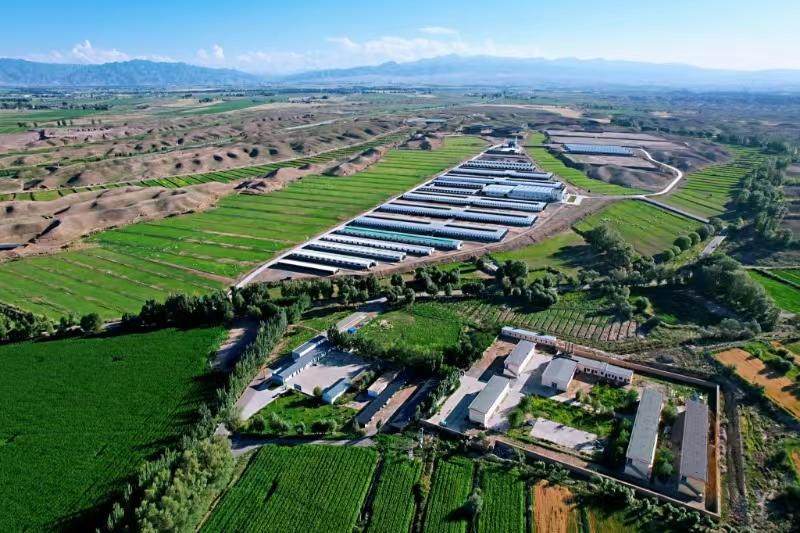Jinchang's Forage and Sheep Farming Go Hi-tech

In recent years, Jinchang city, located in northwest China's Gansu province, has successfully reshaped its agricultural sector by focusing on high-quality forage production, particularly purple alfalfa, moving away from its past focus on traditional crop cultivation. This shift takes advantage of its favorable location and the nourishment provided by snowmelt from the Qilian Mountains.
With policy incentives and market-driven mechanisms, Jinchang has scaled up its forage production, adopting mechanized and standardized practices. Today, it is not only Gansu's largest commercial alfalfa base but also a key national supplier of premium forage.
Now, from forage cultivation to dairy sheep breeding, Jinchang is leveraging technological innovation to drive high-quality development in animal husbandry.
Standardized forage cultivation
As another dawn breaks, busy scenes unfold at Gansu Yuansheng Agricultural and Animal Husbandry Technology Co., Ltd. in Yongchang county. Flatbed trucks loaded with forage line up, waiting to be weighed. The forage undergoes dust removal and compression, transforming small bales into large cubes weighing 0.45 tonnes each, which are then transported to neighboring provinces within 48 hours.
"The alfalfa grown in Yongchang is rich in crude protein content. Professional testing institutions have evaluated that the overall feeding value of Yongchang alfalfa meets the standards for first-grade and superior-grade forage," said Zhang Jinsheng, administrative director of the company.
The company has established long-term strategic partnerships with major ranches such as the China Youran Dairy Group and Mengniu Dairy, along with numerous medium- and small-sized ranches across the country.
Diversifying industrial chain
By fostering new types of business entities and improving the production and operation system within the forage industry, Jinchang has developed 45 forage planting entities, 16 processing enterprises, and five feed production enterprises. These efforts involve over 1,000 farming households and have achieved an annual production capacity of 1.14 million tonnes, forming a fully integrated industrial chain from cultivation to processing and sales.
According to Wang Yan, director of the local sci-tech bureau, technological innovation plays a crucial role in the rapid development of the forage industry. Enterprises have strengthened their cooperation with institutions such as Lanzhou University and Gansu Agricultural University, inviting experts to demonstrate and promote technologies related to planting, storage, pest control, forage processing and quality inspection.
Additionally, Jinchang has established municipal and county-level forage industry associations to connect all parties involved and provide comprehensive services throughout the process. By forming an industrial alliance and setting technical standards for the production and processing of premium forage, Jinchang is promoting the healthy development of the city's forage industry.
Smart sheep farming
At the core breeding farm for dairy sheep of Gansu Yuansheng, high-standard sheep sheds are neatly arranged, and expansive premium forage planting bases stretch as far as the eye can see.
Here, the application of "sheep face recognition system" was observed. Leveraging AI algorithms, the system automatically identifies detailed facial features of the sheep. It swiftly and accurately identifies individual sheep, creating unique tags for each, and records data including breed, age, and health status. Based on this information, the farm's smart management system can automatically adjust feeding plans to meet the nutritional needs of sheep at different growth stages, ensuring precise and optimal delivery of nutritious forage.
Recently, the breeding farm adopted data-driven, automated, and intelligent management. Real-time data on milk production is uploaded to the smart management system and ultimately integrated into the big data platform of the farm.
Zhang explained that the company has established three ecological dairy sheep farms, with a total stock of 39,200 dairy sheep. These farms have achieved a daily milk production of 11 tonnes. Fully incorporating digital technology, the farm implements intelligent management practices such as electronic ear tag identification, automatic flock separation, and automated weighing, ensuring precise care for every dairy sheep — from birth to daily feeding, health management, and milk production.
To promote the high-quality development of the dairy sheep industry chain, Gansu Yuansheng collaborates with institutions to cultivate new varieties of dual-purpose dairy sheep, suited for both meat and milk production. Through continuous efforts, the company's sheep milk has been successfully included in the national list of specialty and high-quality agricultural products.







